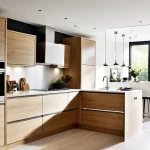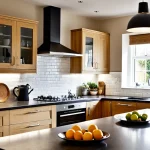Essential foundations for UK kitchen bar success
Creating UK kitchen bar success requires a well-crafted operational strategy grounded in core business principles. Expert advice highlights that starting with a clear and compelling unique value proposition sets a kitchen bar apart in a competitive marketplace. This involves understanding your target audience’s preferences and tailoring menus, ambiance, and service accordingly.
Operational strategy must focus on efficiency and consistency. Leading kitchen bars implement streamlined workflows for food preparation and beverage service, reducing wait times and boosting customer satisfaction. They avoid common pitfalls such as overcomplicated menus or inconsistent quality, which can dilute the customer experience and harm profitability.
Also to read : Revolutionary innovations poised to redefine kitchen and restaurant culture in the uk
Attention to supplier relationships and inventory management also plays a crucial role. Maintaining fresh, high-quality ingredients without excessive waste ensures operational costs stay in check, contributing to sustainable growth.
In sum, expert advice emphasizes combining a strong operational strategy with a distinctive market position to build lasting success in the UK kitchen bar scene. Whether you are emerging or expanding, these foundational elements keep your business agile and customer-focused for ongoing achievement.
Also read : Top design tips for crafting a cozy kitchen in the uk
Insiders’ tips: Maximising business growth and customer appeal
Maximising business growth in hospitality hinges on elevating the customer experience consistently. One crucial business growth tip is focusing on repeat business through personalised interactions and loyalty programmes. When customers feel recognised and valued, they are more likely to return and recommend your venue.
Hospitality secrets often emphasise crafting standout menus that reflect both creativity and local preferences. Curating drink selections that cater to trending tastes, such as craft cocktails or non-alcoholic alternatives, aligns your offering with evolving consumer behaviour. Incorporating local ingredients can also deepen the connection with your customer base, making your menu distinctive and memorable.
Another insider technique involves capitalising on local trends and understanding your target market’s preferences. Observing what draws locals—whether it’s particular flavours, ambience, or event nights—enables you to tailor promotions and menus effectively. This strategic agility enhances your appeal and fuels sustainable growth.
Incorporating these hospitality secrets is a proven method to boost patron loyalty. By intertwining customer experience enhancements with informed menu choices and local insights, your business growth becomes both measurable and enduring.
Design and layout secrets for profitable UK kitchen bars
Thoughtful kitchen bar design is pivotal in enhancing customer flow and boosting sales. A well-planned bar layout ensures staff can move quickly and serve efficiently, reducing wait times and improving customer satisfaction. Interior optimisation balances aesthetics with functionality, creating spaces that feel inviting without compromising operational ease.
Functional layouts integrate the kitchen and bar areas seamlessly, allowing bartenders and kitchen staff to collaborate effectively. For example, arranging the bar close to the kitchen’s serving point minimizes delays, while strategically positioning seating encourages social interaction and comfort. Interior optimisation also considers lighting, acoustics, and materials to craft a vibrant but practical environment.
Designing with customer behaviour in mind promotes natural movement patterns, avoiding bottlenecks during peak hours. An inviting atmosphere combines visual appeal with convenience — sleek surfaces for quick cleaning, accessible storage, and ample prep space. By prioritising both efficiency and ambiance in kitchen bar design, UK establishments can increase turnover, enhance guest experience, and ultimately maximise profitability.
Marketing strategies that elevate UK kitchen bars
Strategic marketing tactics are essential for UK kitchen bars to thrive in a competitive market. One of the most impactful approaches is leveraging digital marketing effectively. This involves engaging customers through social media for bars on platforms like Instagram, Facebook, and TikTok, where visual appeal of cocktails and ambience can captivate potential visitors. By posting regularly, responding to comments, and sharing behind-the-scenes content, bars foster a loyal, interactive community online.
Building a strong online reputation is equally crucial. Encouraging satisfied customers to leave positive reviews on platforms such as Google and TripAdvisor enhances credibility. Additionally, partnering with local influencers and food bloggers can amplify reach by showcasing authentic experiences, attracting followers who trust these figures.
Localized marketing campaigns that resonate with community values are powerful tools. Hosting themed nights or charity events and promoting them through geo-targeted ads ensures messages reach the right audience. These combined marketing tactics not only boost visibility but also deepen engagement, positioning UK kitchen bars favorably in their local scenes.
Learning from UK kitchen bar success stories
UK kitchen bars have carved a notable niche in hospitality by blending creative menus with immersive experiences. Case studies reveal that success often hinges on focused branding, quality food, and seamless service. For instance, leading venues prioritize a distinctive identity that resonates with local clientele while maintaining flexibility to evolve.
Overcoming operational challenges like supply chain disruptions and staff shortages is a common theme. Successful bars implement robust sourcing strategies and invest in staff training to maintain consistency. Competition drives innovation; top UK kitchen bars differentiate through unique concepts and personalized customer engagement.
Adaptable best practices from these success examples center on efficient space use, dynamic menu rotation, and leveraging technology for reservations or inventory. Embracing feedback and continuous improvement also stands out, enabling venues to stay relevant. Hospitality enthusiasts can draw from these insights to enhance their kitchen bar operations, combining creativity with pragmatic approaches to thrive in a competitive UK market.
Emerging trends and future-proofing your kitchen bar
Staying ahead in the kitchen bar trends means embracing both sustainability and technology. Today’s hospitality innovation focuses keenly on eco-friendly practices. Many UK kitchen bars are integrating energy-efficient appliances and using recyclable materials to reduce their environmental footprint. This approach resonates well with environmentally conscious customers and cuts long-term operational costs.
Technology integration is another game-changer. Adoption of smart lighting, automated inventory systems, and contactless payment solutions enhances efficiency and customer experience. These tools allow staff to focus more on personalized service, which is vital in a competitive market. Moreover, future strategies that incorporate data analytics help bars anticipate customer preferences and manage stock effectively.
Long-term resilience depends on adaptability. Flexibility in service models, such as incorporating takeaway options or hybrid spaces, helps kitchen bars navigate unpredictable market changes. Blending traditional hospitality with modern innovations positions venues to thrive.
Embracing these hospitality innovation trends and sustainable practices is key to future-proofing your kitchen bar. Making proactive investments now can ensure your establishment remains vibrant and responsive to evolving consumer demands.


